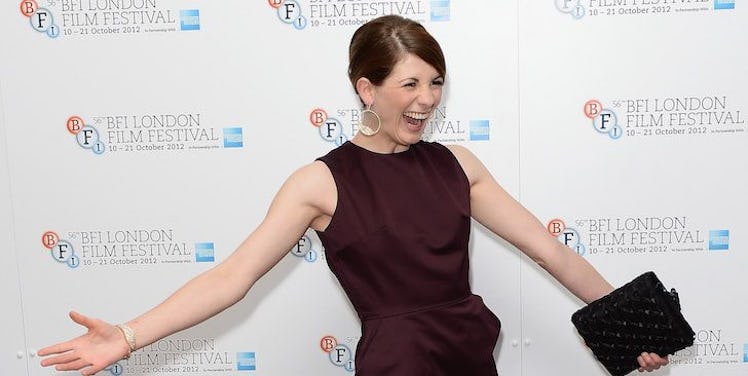
5 Reasons ‘Doctor Who’ Casting A Female 13th Doctor Is Such A Huge Deal
If you don't follow long-running British television series Doctor Who, you may have been baffled Sunday to see the crazy, out-of-control hype surrounding news that the series has cast its latest lead — and it is a woman.
Jodie Whittaker was announced on July 16 as the 13th Doctor, taking over the role from outgoing star Peter Capaldi. What's the big deal, you may have wondered. Shows cast female leads… well, if not every day, reasonably often. But this one really is a big deal. Here's why.
First, a quick crash course:
The premise of Doctor Who is that a time-travelling alien called a Time Lord, who every so often changes form and personality for *reasons* (the actor wanted to leave the show) likes to visit Earth, pick up a human companion, and go gallivanting around the universe and timeline on adventures.
Frequently, this has been in the stereotypically gendered context of a male Time Lord (hero) and a female companion (sidekick). Every now and then there's a romantic subplot between said male Time Lord and female companion.
Got it? Okay. Here we go.
The show has been around for more than 50 years, and has never cast a woman (or person of color) in the leading role.
Doctor Who has been running since 1963, with a big gap from 1989 to 2005, during it was made into a movie. In that time, there have been 12 different (white, male) actors who took on the lead role, known as just “the Doctor.” That's several decades of white dudes, if you're keeping count.
Some other things that have happened in those 50-odd years: we sent people into space, the Berlin Wall fell, the feminist movement happened, the Civil Rights Act was passed, computers were created, miniaturized, and combined with phones so you can share photos of your pizza.
And yet, they couldn't cast a woman as the lead.
Doctor Who has influenced generations of artists and producers.
After more than 50 years, the show's impact has been huge. The show has influenced shows such as Rick and Morty, Futurama, and Community, where it was actually lovingly parodied. It's added new words to the English language, like the prefix “cyber.” Hitchhiker's Guide to the Galaxy author Douglas Adams worked on the original show as a screenwriter.
And in all that time, no one who was influenced by the show got to see a woman taking the lead. If the show and its influence continue another 50 years (a tall order, but it's definitely possible), the creators, show runners, and writers of the next generation will hopefully have grown up with female heroes being the norm rather than the exception.
This little girl is already pretty psyched:
Women and minorities are pretty underrepresented in sci-fi (and TV in general).
Science fiction can be an unwelcoming place for women and people of color. Women tend to be relegated to a few kinds of stereotyped roles, and people of color often don't even get to be in these kinds of projects.
As a white woman, Whittaker's casting clearly does not solve all. But it's a first step. Next up, maybe we can have a Doctor who's a person of color? And then another one. Definitely, a woman of color…
People were pushing for it so hard, and they got it.
People really, really wanted to see a female Doctor. Tilda Swinton was a fan favorite for the role before the announcement, and in 2013 there was a fan campaign to snag the role for Great British Bake Off host Sue Perkins as the 12th Doctor (Peter Capaldi, who's now stepping down, got the role instead).
Television reflects the world we live in (if sometimes more fantastical and with time travel), and it's important to keep advocating to see women and minorities in leadership roles.
Can you imagine all the little girls this is going to inspire?
Seriously, that, if nothing else. It's so important for little girls to see women going out there, adventuring, making mistakes, being heroes, and having their own fantastical stories — not just being sidekicks in someone else's story.
Whittaker herself seems pretty thrilled (if awed).
Fifty years in the making carries an awful lot of weight.